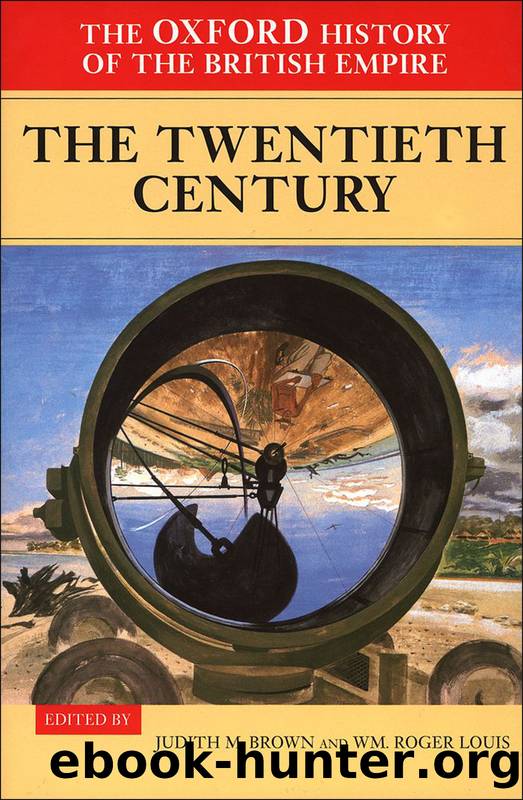The Oxford History of the British Empire: Volume IV: the Twentieth Century by Brown Judith; Louis Wm. Roger; Louis Wm Roger

Author:Brown, Judith; Louis, Wm. Roger; Louis, Wm Roger
Language: eng
Format: epub
Publisher: Oxford University Press, Incorporated
Published: 1999-07-14T16:00:00+00:00
Figure 18.1. Government in India
Imperial governance has to be understood also in a larger context of Imperial thinking and interests. Unfortunately for historians, the British rarely articulated theories of imperialism or philosophized about the nature of their Empire, their goals, and obligations.3 Moreover, the honeycomb of different religious, social, military, civilian, and business interests which comprised ‘the British’ in India makes discussion of any uniform Imperial attitude particularly difficult. Yet at the start of the twentieth century most British people connected with India would have subscribed to a view of the subcontinent and its peoples that underlined their difference from the British—in religion, morals, society, and political identity and capacity. In India difference and assumed racial superiority were demonstrated in British patterns of residence, apart from their Indian subjects, in ‘white town’, in the bungalows of civil lines, or supremely in the hill stations where they took their holidays in an environment as nearly like ‘home’ as they could contrive. These assumptions were also evident in the racially self-contained life of the British, whose standards and hierarchies were policed by the memsahibs as guardians of English domesticity and gentility.4 The reverse of this was a distaste for Indian society, particularly for Hindu customs, a distaste which focused on religion, caste, and the treatment of Indian women. Indian society was seen as decadent, irrational, and dominated by religion. In political terms Indians were seen as almost irrevocably divided by religion, caste, and language, lacking the civic virtues of Victorian bourgeois England, and incapable of either national sentiment or self-determination. Unlike their early-nineteenth-century predecessors, the British in India now felt only limited obligations to their Indian subjects. Imperial duty was to keep the peace, to protect the subcontinent’s borders, to alleviate and if possible prevent famine, and to protect the supposed backbone of rural society (the ‘real’ India) from land loss and extortion by moneylenders; and in the much longer term to enable social and political reform by slow-working processes of education, missionary work, and foreign example. It was supposed that the Raj’s duty was not to manage the economy or engage in social engineering but to protect society from radical upheaval and to permit the workings of British and Indian private investment and philanthropy.
Between the wars, however, the British were forced to reconsider many of their assumptions about India, particularly their dismissal of educated Indians as legitimate spokesmen for a modern Indian nation, and their projected timescale for political advance within the Empire. Similarly, they were forced to reevaluate the Imperial worth of India and the purposes India could serve in the worldwide Imperial enterprise. Before the First World War those purposes had been plain. India had to be a staging-post in Imperial communications and the base of a low-cost Imperial army. India itself was significant for providing considerable expatriate employment, while exporting important flows of unskilled, indentured labour within the Empire; for its role in British overseas investment and worldwide trade; and for generating sterling remittances to pay for the ‘home charges’ of the Raj.
Download
This site does not store any files on its server. We only index and link to content provided by other sites. Please contact the content providers to delete copyright contents if any and email us, we'll remove relevant links or contents immediately.
| Elections & Political Process | Ideologies & Doctrines |
| International & World Politics | Political Science |
| Public Affairs & Policy | Specific Topics |
| United States |
The Secret History by Donna Tartt(18157)
The Social Justice Warrior Handbook by Lisa De Pasquale(11951)
Thirteen Reasons Why by Jay Asher(8451)
This Is How You Lose Her by Junot Diaz(6434)
Weapons of Math Destruction by Cathy O'Neil(5829)
Zero to One by Peter Thiel(5488)
Beartown by Fredrik Backman(5351)
The Myth of the Strong Leader by Archie Brown(5237)
The Fire Next Time by James Baldwin(5016)
How Democracies Die by Steven Levitsky & Daniel Ziblatt(4952)
Promise Me, Dad by Joe Biden(4908)
Stone's Rules by Roger Stone(4857)
100 Deadly Skills by Clint Emerson(4689)
A Higher Loyalty: Truth, Lies, and Leadership by James Comey(4550)
Rise and Kill First by Ronen Bergman(4544)
Secrecy World by Jake Bernstein(4388)
The David Icke Guide to the Global Conspiracy (and how to end it) by David Icke(4379)
The Farm by Tom Rob Smith(4323)
The Doomsday Machine by Daniel Ellsberg(4245)
